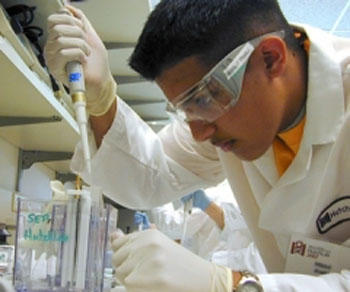Program Spotlight: Partnership for the Advancement of Cancer Research Project Brings Cancer Research Training to Underrepresented Students at New Mexico State University
, by CRCHD staff
In Las Cruces, New Mexico, New Mexico State University (NMSU) is making inroads into the recruitment and training of greater numbers of Native Americans and Hispanics for careers in cancer research, as well as drawing greater attention to the importance of cancer health disparities research. It's all part of a collaboration between NMSU and the Fred Hutchinson Cancer Research Center (FHCRC), known as the "Partnership for the Advancement of Cancer Research Project." The collaboration was initiated in 2002 with the assistance of a Partnerships to Advance Cancer Health Equity (PACHE) U56 award.
Under the leadership of principal investigators Mary O'Connell, Ph.D., (NMSU) and Beti Thompson, Ph.D., (FHCRC), the Partnership for the Advancement of Cancer Research Project offers three levels of diversity training opportunities to underrepresented NMSU students interested in biomedical research: undergraduate, graduate, and postdoctoral.
The Cancer Research Internship for Undergraduate Students is an intensive nine-week program, designed to provide research and mentorship experiences, and professional development workshops. Students are paired with faculty mentors after selecting one of several fields to major in—basic science, human biology, public health, clinical research, or vaccine and infectious diseases. Students complete a research project under the guidance of their mentors and present their research at a competitive poster session.
"A student who decides to major in public health, for example, may want to look for links between cancer and its possible triggers, such as diet and lifestyle factors or environmental and genetic factors," says Helena Loest, project coordinator at NMSU. "On the other hand, if the student decides on clinical research, he or she might concentrate on developing and analyzing new treatments for cancers and other diseases."
Graduate students at NMSU may apply to conduct cancer research at FHCRC's Division of Public Health Sciences, where there are mentoring experts in epidemiology, cancer prevention, health disparities, health economics, biostatistics, bioinformatics, molecular diagnostics, and other population science disciplines. The program is designed to provide research experience and mentorship, and, as in the undergraduate program, students complete a mentored research project and participate in a competitive poster session. They also partake in professional development workshops and weekly research seminars.
The Cancer Teaching Fellows Program, a two-week residency at NMSU, provides an opportunity for FHCRC postdoctoral fellows to gain mentored undergraduate biology teaching experience and diversity training at NMSU, while at the same time enhances the cancer education curriculum at NMSU.
All told, 213 underserved individuals (85 undergraduate and 99 graduate students, 15 postdoctoral fellows, and 14 junior faculty members) have been mentored and trained, and 54 grants have been awarded. To date, 19 pre-pilot projects, 16 pilot projects, and seven full projects have been shepherded, resulting in 63 scientific publications.
Before any major disparity research project involving Navajo participants is initiated within the partnership program, it is rigorously reviewed by the Navajo Nation Human Research Review Board. The Board also sponsors a conference in Window Rock, Arizona to facilitate dissemination of research results to Navajo Nation agencies.
The Native American students population at NMSU faces obesity and other risk factors for cancer -- significant health issues that aren't being dealt with at the university's student health center. Rebecca Palacios, Ph.D. (NMSU) and collaborators from the partnership's Outreach Core are planning to address these health risks with programs promoting better nutrition, physical activity, and healthy techniques for coping with stress.
Palacios says that understanding health beliefs and language used by the Native American tribes are keys to delivering effective health promotion and cancer prevention efforts. "Simply uttering the word 'cancer' means certain death among some tribes," she says. "Others fear they will get cancer if they talk about the disease or tour through the inflatable colon display used to present the risk factors and progression of colorectal cancer."
To assist in culturally tailoring their health education efforts, the partnership's Outreach Core hired Eugena Armijillo, a Native American community health educator knowledgeable of Navajo culture and fluent in their language.
"Coming from the Navajo Nation myself, I have been able to see a lot of health concerns that haven't been addressed or there is little awareness of," she says. "Having the opportunity to work with the Navajo population is very important to me and, in a few elders' opinions, it's a way of giving back." Armijillo pauses, "There is a saying in Navajo which translates to take care of your children, for one day they will meet on the path and help you in return."
